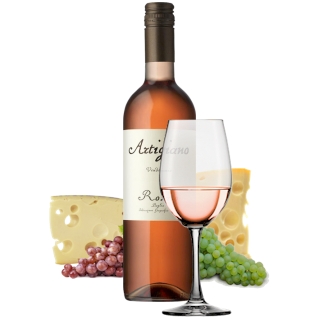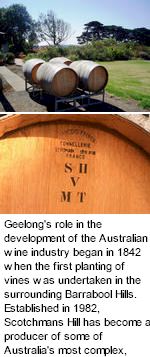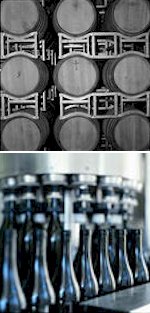


Established in 1982, Scotchmans Hill has become a producer of some of Australia's most complex, elegant and consistent wines. Scotchmans Hill is located on Mount Bellarine which was named by the Scottish immigrants who settled the Mount Bellarine area in the 1840s. Mount Bellarine was formed over 30 million years ago by tectonic movement which formed Port Phillip Bay and the surrounding volcanic region of Geelong and Mount Bellarine.

The Geelong region's role in the development of the Australian wine industry began in 1842 when the first planting of vines was undertaken in the surrounding Barrabool Hills. Grown and managed mainly by Swiss immigrants, these vineyards were used to produce wine to be sold through the frequently held auctions in the city. The area flourished under the experienced management and by 1869 there were over 400 hectares planted. Many notable Swiss vine growers visiting added superior knowledge and quality to the wines.
Today there remains 250 vine growing hectares in the Geelong region. The Browne family have a history in the region when George and Rita Browne would visit their holiday destination in Portarlington taking their children with them. Their son, David Browne, became very familiar with the region and when given the chance to own property on Mount Bellarine in 1975 he and wife Vivienne bought Scotchmans Hill, a derelict dairy farm.
The Southern Ocean and strong, cool Atlantic winds combine to produce the cool maritime climate of the Bellarine Peninsula. The vineyards at Scotchmans Hill are planted on north facing slopes at a latitude of 42 degrees south and an altitude of approximately 120 metres. The combination of these factors greatly reduces the risk of disease, the use of agrochemicals and synthetic additives.

As an extension to their activities, the Scotchmans Hill contract consultancy company allows suitable grape varieties to be grown in appropriate mesoclimates around the Bellarine Peninsula and Geelong. Current contracts amount to 170 acres from ten growers.
Disease and pest control have been minimized by the installation of a meteorological information center. This maintains online climatic data with which our viticulturist can make timely decisions in determining necessary disease and pest control measures. The system further minimizes the necessity for agrochemical and synthetic input.
In 1998 Scotchmans Hill built a new winery complex from ground breaking technology in construction. The construction was a 'first' for Australia and has been used in numerous subsequent winery applications. The existing winery now has an 8000 cubic metre barrel storage room and packaging facility and extensive temperature controlled, stainless steel storage along with 900 one to three year old French barriques (Alliers, Nevers, Troncais and Vosges).
Scotchmans Hill employ four qualified winery staff to manage the delicate vinification and elevage processes required for complex and balanced wines. Both winery and vineyard staff are employed on an educational advancement program where each employee studies a viticulture or vinification course to move through the company.
